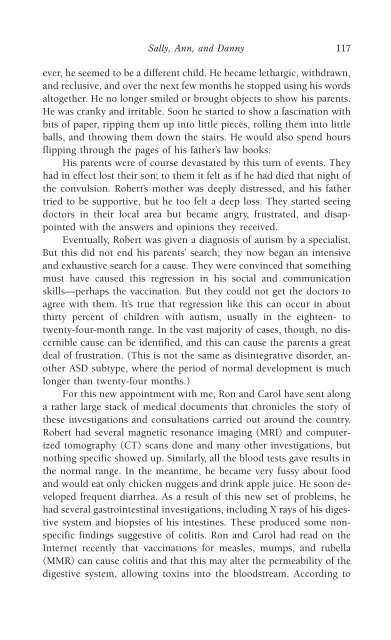978-1572305441
autism
autism
Create successful ePaper yourself
Turn your PDF publications into a flip-book with our unique Google optimized e-Paper software.
Sally, Ann, and Danny 117<br />
ever, he seemed to be a different child. He became lethargic, withdrawn,<br />
and reclusive, and over the next few months he stopped using his words<br />
altogether. He no longer smiled or brought objects to show his parents.<br />
He was cranky and irritable. Soon he started to show a fascination with<br />
bits of paper, ripping them up into little pieces, rolling them into little<br />
balls, and throwing them down the stairs. He would also spend hours<br />
flipping through the pages of his father’s law books.<br />
His parents were of course devastated by this turn of events. They<br />
had in effect lost their son; to them it felt as if he had died that night of<br />
the convulsion. Robert’s mother was deeply distressed, and his father<br />
tried to be supportive, but he too felt a deep loss. They started seeing<br />
doctors in their local area but became angry, frustrated, and disappointed<br />
with the answers and opinions they received.<br />
Eventually, Robert was given a diagnosis of autism by a specialist.<br />
But this did not end his parents’ search; they now began an intensive<br />
and exhaustive search for a cause. They were convinced that something<br />
must have caused this regression in his social and communication<br />
skills—perhaps the vaccination. But they could not get the doctors to<br />
agree with them. It’s true that regression like this can occur in about<br />
thirty percent of children with autism, usually in the eighteen- to<br />
twenty-four-month range. In the vast majority of cases, though, no discernible<br />
cause can be identified, and this can cause the parents a great<br />
deal of frustration. (This is not the same as disintegrative disorder, another<br />
ASD subtype, where the period of normal development is much<br />
longer than twenty-four months.)<br />
For this new appointment with me, Ron and Carol have sent along<br />
a rather large stack of medical documents that chronicles the story of<br />
these investigations and consultations carried out around the country.<br />
Robert had several magnetic resonance imaging (MRI) and computerized<br />
tomography (CT) scans done and many other investigations, but<br />
nothing specific showed up. Similarly, all the blood tests gave results in<br />
the normal range. In the meantime, he became very fussy about food<br />
and would eat only chicken nuggets and drink apple juice. He soon developed<br />
frequent diarrhea. As a result of this new set of problems, he<br />
had several gastrointestinal investigations, including X rays of his digestive<br />
system and biopsies of his intestines. These produced some nonspecific<br />
findings suggestive of colitis. Ron and Carol had read on the<br />
Internet recently that vaccinations for measles, mumps, and rubella<br />
(MMR) can cause colitis and that this may alter the permeability of the<br />
digestive system, allowing toxins into the bloodstream. According to



